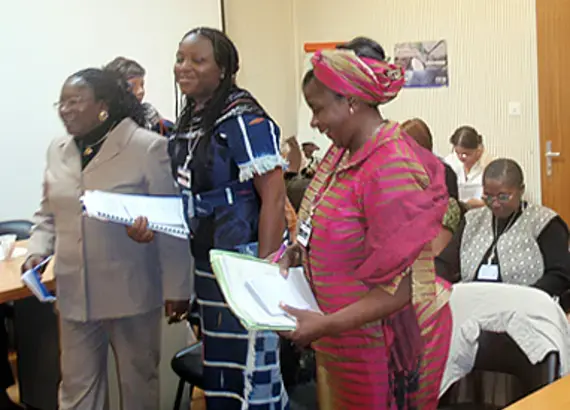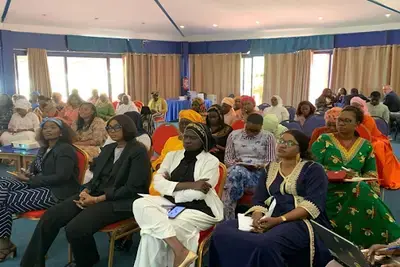
Success Story
Women Speak Out Against Discrimination in Burkina Faso
In the West African country of Burkina Faso, gender discrimination touches many aspects of women's lives. Inheritance rights are unequal between men and women, violence against women is pervasive and women have lower literacy rates — 22 percent compared to 37 percent for men, according to the 2009 U.N. Human Development Report.
To raise awareness about these problems, a coalition of representatives from Burkinabe women's and human rights organizations traveled to Geneva, Switzerland, in October to present a report on the status of women's rights in Burkina Faso to the U.N. Committee on the Elimination of Discrimination against Women. The trip was funded by the Swedish International Development Cooperation Agency. The U.N. committee is reviewing the government's progress on carrying out the international Convention on the Elimination of all Forms of Discrimination against Women (CEDAW), to which Burkina Faso is a signatory.
Every four years, governments submit reports on the status of CEDAW implementation to the committee in Geneva. At the same time, civil society organizations have the opportunity to develop and present "shadow" reports to supplement or present alternative information to what the government has presented. This is the first time that representatives from Burkina Faso were able to travel to Geneva and present an alternative report to the U.N.
The Burkinabe representatives outlined five major findings and recommendations impacting women's rights in Burkina Faso. They said:
- There is no definition of discrimination in national legislation and recommended that the government incorporate such a definition in national legislation by 2012.
- A quota law passed in April that mandates that 30 percent of all candidate lists be women is too vague about how it will be implemented. The group encouraged the government to take action to ensure implementation.
- Girls do not attend school at the same rate as boys. According to the U.N. Human Development Report, 29 percent of girls are enrolled in school compared to 36 percent of boys. Coalition members urged the government to take measures, such as building boarding schools for girls, that would encourage parents to send girls to school.
- Equal access to healthcare for women is lacking due to their social and economic dependence on men. Men usually control family finances, so women need to seek permission from their husbands before visiting healthcare facilities, particularly if they are seeking contraceptives. The group encouraged the government to provide free maternal healthcare.
- Violence against women is pervasive. The coalition urged the government to adopt new laws on domestic violence.
After the presentation, coalition members answered questions from the committee. Asked how domestic violence cases were handled by the police and judiciary, they said women were reluctant to press charges because they feared being reprimanded at home for airing their problems in public. The committee also asked about how the government combats child trafficking. The women said that many children go to Côte d’Ivoire to work, but no figures were available on how many children went to Côte d’Ivoire willingly and how many were sold across the border.
After the session in Geneva, the committee developed recommendations for the government of Burkina Faso. Members plan to identify the two most critical, such as a law against domestic violence, for follow-up advocacy activities.
Related:
Pictured above: Women from the coalition practice their presentation to the committee in Geneva.
Published on November 19, 2010



